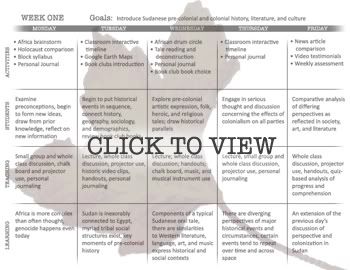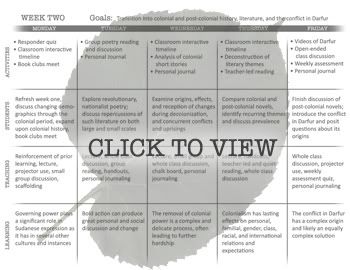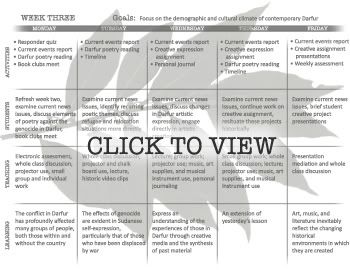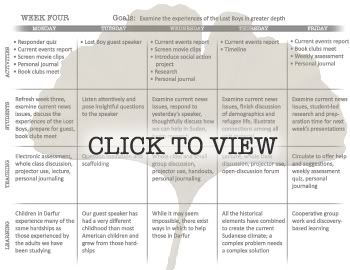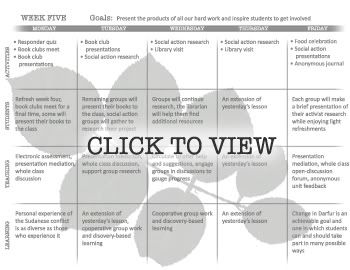Please find below a complete unit overview, the rationale for our chosen approach and methods, the goals we would hope to achieve within this unit, as well as the Illinois State Board of Education standards we would use to assess student learning in the areas of English and history.
To view or download this information in document form, please click here.
CONCEPTUAL HUMANITIES UNIT
History and Literature of Sudan
During the first four weeks of the unit, students will be responsible for completing daily journal entries in a composition notebook that will be provided for them; generally, they will be asked to write on certain topics, but sometimes they will be allowed to relate whatever they feel relevant to our work on Sudan. They will also form groups and choose a day to informally present - using a maximum of five minutes - a current news article on Sudan during weeks three and four. Students will participate in book clubs throughout the unit as well; they will read their designated novels outside of class and meet in class each Monday, beginning in week two, to discuss what each has learned and compare notes. Ultimately, in the final week of the unit, each book club group will give a ten-minute presentation based on their readings. In these same groups, students will also research different social action organizations and will choose one to research more fully, present to the class in a short five-minute presentation, and ideally become involved with themselves. On Mondays, students will also participate in Promethean Responder electronic quizzes to review what they learned in the previous week. The Responder quizzes will not be graded, but instead serve only to refresh the previous week's material and facilitate meaningful connections with new materials. Every Friday through week four, students will complete an open note, brief history quiz, which will be graded. A timeline that will stretch along the top of the wall in the classroom will be an ongoing collaborative project the students will be responsible for completing. Students will add pictures, text blurbs, factoids, etc., to appropriate points along the timeline and each student will be responsible for adding at least one item to the timeline by the end of the unit. This will serve as a visual representation of student growth and learning.
The unit is also rich with technology and multimedia; students and teachers will utilize PowerPoint presentations, video clips from documentaries, the Promethean Responder quizzes, student Internet research, and Google Earth maps.
In the first week, the main focus will be paid to the pre-colonial and colonial history and literature of Sudan. We will start by having students brainstorm to activate prior knowledge on Africa and Sudan followed by slideshows and video clips to introduce students to the current situation in Sudan. Students will then be presented with a basic syllabus and learn what will be expected of them in the next five weeks. They will also be introduced to their journal assignments and learn about and choose their book club novels. Finally, students will begin learning about the pre-colonial historical contexts and literature, with special attention paid to oral culture, and discuss and write about this new material. The same will be done with colonial history and literature using news articles from these time periods.
We will work with colonial, post-colonial, and some Sudanese Civil War history and literature in the second week of the unit, making use of concurrent poetry and short stories to illustrate certain concepts. The causes and context of conflict in Sudan will be discussed, as well as the influence of colonialism on these conflicts. There will be further discussion of the effects of decolonization and its impact on the instability of Sudan.
The third week will be dedicated to the Sudanese Civil War and to the conflict in Darfur, as well as to contemporary Darfur poetry. Historical discussion will center upon the Sudanese Civil War, the participants of the Civil War, the Darfur refugee camps, and ethnic cleansing and genocide. There will also be a focus on the cultural history, including visual art and music. Students will respond creatively to this week's poetry through traditional essay, visual artistic pieces, poems, dramatic monologues, or songs or musical pieces.
The fourth week will focus on the experiences of the Lost Boys of Sudan and Sudanese refugees. This week, we will bring in one of the Lost Boys as a guest speaker. Significant time will be spent preparing students to get the most out of this experience before and after his visit, discussing what we expect from him and what we learned retrospectively. The literature this week will consist of excerpts from pieces both by and about the Lost Boys.
The final week will be spent working on and presenting their book club presentations and their group social action projects. They will be given ample time in class to prepare for these presentations and to do Internet research relating to their social action projects. On the last day, we will bring in snacks and celebrate the students’ hard work throughout the unit while listening to social action presentations.
Special care will be given that each lesson, more or less, and each week as well as the unit as a whole will reflect the Basic Instructional Model. We will activate prior knowledge when each new topic is introduced and discuss what the students already know and believe. Students will be provided with access to new information in as engaging a way as possible and encouraged to respond to this new knowledge in any way they feel appropriate. Responses may be in the form of class discussions, journal entries, creative assignments, timeline additions, and oral presentations. The social action projects will be the unit's culminating extension activity in which students will utilize what they have learned throughout the humanities unit to empower themselves to take action.
RATIONALE
Over the course of five weeks, we plan to thoroughly examine the genesis, growth, and implications of the conflict in Darfur, Sudan, through a joint 11th grade English/history conceptual humanities unit. Each week will comprise of five 50-minute class periods, Monday through Friday, during which the students will be introduced to the conflict and ultimately have the opportunity to take action in the way most meaningful to each of them.
The conflict in Darfur, Sudan, is an important contemporary issue that goes unnoticed and misunderstood by many in the world today. As the largest country in Africa, Sudan embodies a broad range of cultural diversity and complexity, as well as conflict, turmoil, and oppression. Due to the misconceptions, false portrayals, and obscured truths conveyed through the media, however, the public is often ignorant of the very real tensions that surround the people of Sudan. In order to remedy this lack of awareness and amend common misperceptions, our humanities unit endeavors to help these students develop their own opinions on the issue through a multifaceted historical and literary approach.
The unit will begin with two weeks of background and historical scaffolding that will establish a basic knowledge of the geography, culture, and demographics in Sudan, all of which lay out the groundwork for the current conflict in Darfur. All historical concepts will be supported and expanded upon with relevant, contemporaneous literary pieces meant to more clearly elucidate cultural and social perspectives of the period. This introductory period will ideally challenge the students’ preconceived notions about the conflict and establish a more factual foundation of the issues in Sudan and Africa in general. After two weeks of background and historical scaffolding, we will delve into a three-week unit covering various perspectives of the genocide in Darfur. By examining their culture through music, film, art, poetry, memoirs and other works of literature, the students will establish a close rapport with the Sudanese way of life that is invisible to the media. We also plan to invite a Sudanese speaker to class in order to allow the students an intimate perspective of catastrophic events that have transpired in their own lifetimes. In doing so, they will learn to be more accepting, tolerant, and compassionate for those embroiled in the crisis in Darfur.
Ultimately, this unit is meant to help students learn that history is not confined exclusively to the past, nor is it separate from their own lives, and understand the importance of being proactive in trying to resolve this and other ongoing conflicts. Furthermore, through close examinations of myriad perspectives on the conflict in Darfur, we hope to inspire personal investment and understanding of the complexities of such a situation and those like it in the future.
ISBE STANDARDS
English
1.B.5a Relate reading to prior knowledge and experience and make connections to related information.
As we introduce Sudan and the crisis in Darfur, we will utilize prior knowledge gained from previous units to relate to the current oppression surrounding Sudan today. We will continue to activate prior knowledge with the weekly Responder quizzes and observe how well students are able to make connections from previous units and weeks to the current material.
3.C.5a Communicate information and ideas in narrative, informative and persuasive writing with clarity and effectiveness in a variety of written forms using appropriate traditional and/or electronic formats; adapt content, vocabulary, voice and tone to the audience, purpose and situation.
The students will communicate information and ideas in narrative through the daily journals they write, wherein they convey thoughts and perspectives regarding Sudan. They will use persuasive writing skills for their social action project, during which they will have to persuade others that their approach to resolving the conflict will be effective. We will continually check for coherence, organization, content, and effectiveness of the students’ journals & social action project group work.
4.B.5b Use speaking skills to participate in and lead group discussions; analyze the effectiveness of the spoken interactions based upon the ability of the group to achieve its goals.
Students will exercise communication skills during class and particularly during their weekly book club meetings and end-of-unit social action projects which will both be primarily student-led. We will nonetheless scaffold and support students' ability to work in groups and aid group discussion when necessary and check that each presentation is organized, effective, persuasive, and coherent.
5.A.5b Research, design and present a project to an academic, business or school community audience on a topic selected from among contemporary issues.
The social action project will test students’ ability to competently research and present their findings to their classmates in a coherent and interesting manner. We will gauge the groups’ success based upon their ability to gather reliable and supportive research and synthesize it into feasible and creative activist projects.
History
16.A.5a Analyze historical and contemporary developments using methods of historical inquiry (pose questions, collect and analyze data, make and support inferences with evidence, report findings).
We will examine Sudanese history in three distinct periods, pre-colonial, colonial, and post-colonial. We will use primary and secondary sources to examine the history of Sudan. There will be a strong emphasis on students coming up with their own judgments and interpretations of the material presented. Student understanding will be evaluated through the use of open-ended quiz questions and timeline research assignments.
16.A.5b Explain the tentative nature of historical interpretations.
We will utilize primary and secondary sources, including personal accounts, in order to draw conclusions about historical events. We will compare and contrast sources in order to demonstrate the diversity of historical interpretations. Daily journals will give students the opportunity to demonstrate these skills.
16.B.5b (W) Describe how tensions in the modern world are affected by different political ideologies including democracy and totalitarianism.
Students will understand that the Sudanese civil war was related to the Cold War. Students will be given the opportunity to make connections between religious and ethnic affiliations and political and economic developments. Student understanding will be evaluated through the use of open-ended quiz questions and timeline research assignments.
16.B.5c (W) Analyze the relationship of an issue in world political history to the related aspects of world economic, social and environmental history.
The class will examine how demographics, geography, and social groupings (ethnic and religious) contributed to the Sudanese Civil War, economic development, and ongoing conflict within Sudan and the refugee camps. There will be an ongoing discussion of how art, demographics, environmental conditions, and society has changed in Sudan as time has passed. Students will demonstrate an understanding of these connections through class discussions and weekly quizzes.
